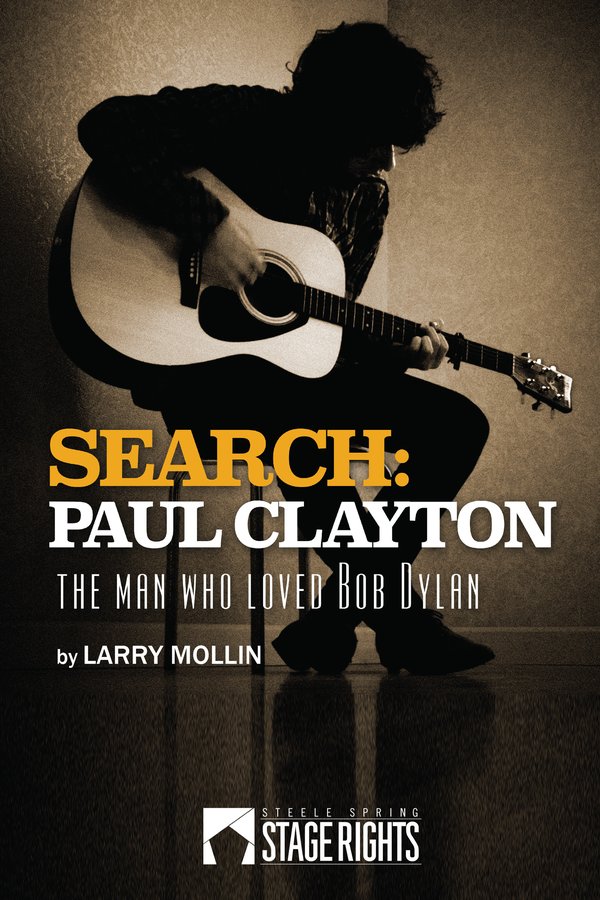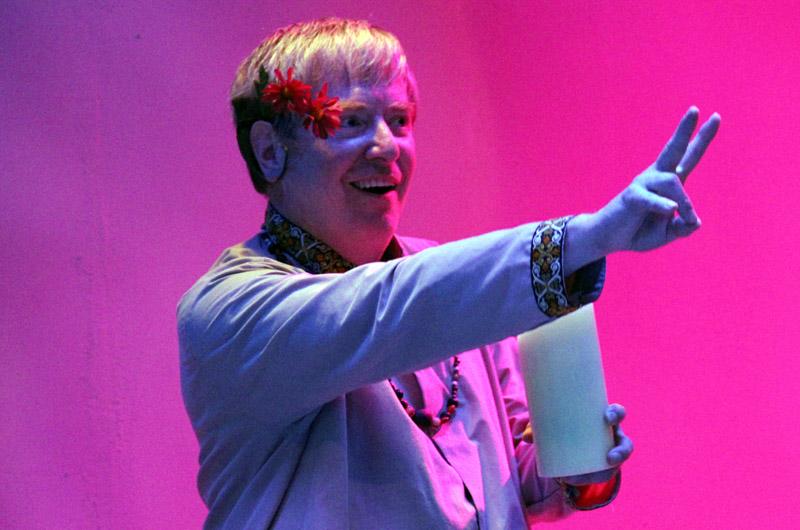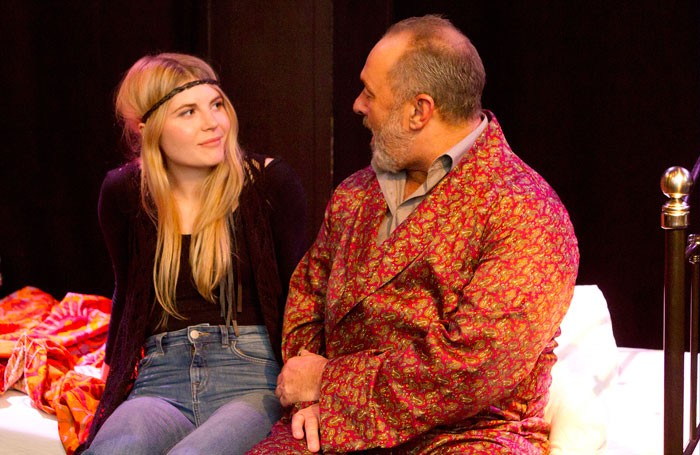
Mark Coffin as Timothy Leary in playhouse production. The set of High Time, the new play that opened at the Martha’s Vineyard Playhouse last week, is an early-1960s suburban interior with a kitchen, living room, front hall and jumble of low-fi audio-visual equipment to one side. It was designed by Lisa Pignato and the domestic surroundings give no hint of the psychedelic joys and existential lows that lie ahead for the play’s six characters. Soft piano music plays. There’s a sofa, of course, with a matching armchair. And there’s a young woman in a lab coat, making notes on a clipboard. This is Lisa Bieberman, dedicated assistant to Harvard researcher Timothy Leary. She is also his lover. Autumn Chiklis and David PB Stephens. — MJ Bruder Munafo The character is waiting for the participants in Mr. Leary’s latest LSD experiment to arrive. Compellingly played by Autumn Chiklis — daughter of TV star Michael Chiklis (The Shield) and an accomplished actress in her own right — Ms. Bieberman is a true believer in the therapeutic powers of psychedelic drugs. LSD can “make clergymen find their belief in God again,” she says. Ms. Bieberman also functions as the conscience of Larry Mollin’s play, which takes place on the night in May, 1963 when Harvard University fired Mr. Leary and fellow researcher Richard Alpert, thus ending the LSD experiments. Mr. Mollin sees this expulsion as pivotal — not only for Mr. Leary, who made “Turn On, Tune In, Drop Out” a mantra, but for America’s shared cultural history from the 1960s onward. While the play is rich in comic moments, it also poses some sobering questions: What clinical benefits were lost for good when acid was abandoned to the counterculture? How might the 1960s have developed if LSD had remained a therapy and research drug instead of a recreational high? And…did JFK take LSD? As High Time begins, lysergic acid diethylamide is a legal substance and Harvard is funding research into its psychological effects on graduate students and other volunteers. Played by Mark Coffin, Mr. Leary tells Ms. Bieberman that this evening’s LSD participants were carefully chosen to help win acceptance for the mind-expanding drug in various circles of influence. Allen Ginsberg (David Henry Gerson) is “secretary-general of all hip culture,” Mr. Leary explains; Alan Watts (David PB Stephens) is a leading voice in American Buddhism, capable of speaking to the spiritual aspects of the acid experience; Mary Meyer (Victoria Adams-Zischke), ex-wife of a CIA chief, has “class and breeding — key to the D.C. power structure.” (She is also the mistress of President John F. Kennedy, Jr., and evidently thinking about taking LSD with him in the near future.) Rachel Claire and Victoria Adams-Zischke. — MJ Bruder Munafo The fourth “intranaut,” (Mr. Leary’s term), is a lovely young dancer, Rosemary Woodruff (Rachel Claire), who’s not quite sure why she’s there in the first place. But by the end of the evening, it’s clear she will be back to stay. Once the volunteers arrive, and after hearing by phone from Mr. Alpert that things are not going well with the Harvard administration, Mr. Leary impulsively decides to “dose” along with his subjects. Ms. Bieberman alone abstains as the other five characters toss back their acid-laced sugar cubes and begin the inner journeys that she, as a researcher, is there to observe and probe. She’s also in charge of the mood. “I strongly urge you not to let the sexual cat out of the bag,” she tells Mr. Leary as the four volunteers begin necking on the couch. To distract them, she reads Boston Globe headlines and shows war-atrocity slides. Directed by Randal Myler, the all-Equity cast delivers consistently believable and often moving performances as their characters encounter themselves, each other and their suddenly, molten condition. A sullenly dignified and prickly Mr. Watts seeks comfort in alcohol, fending off Ms. Beiberman’s clinical interest with lines like “Trying to define yourself is like biting your own teeth.” Mark Coffin and David Henry Gerson. — MJ Bruder Munafo The wisecracking Mr. Ginsberg goes mute, then explodes into words, showering poetry from the stair landing. Mr. Gerson has mastered the incantatory cadences of the poet’s speaking voice, and it’s not hard to imagine that it really is a young Allen Ginsberg on the stage. Ms. Woodruff dances. Ms. Meyer bakes cookies, then decides to eat some mayonnaise because it “goes with everything.” She also flirts on the phone with JFK and promises to “bring some back.” After Mr. Alpert calls Mr. Leary again to say that Harvard has closed the research project and fired them both, the experiment begins to go haywire in both hilarious and heartbreaking ways. And, Mr. Mollin seems to suggest, so do the 1960s. Freed from what Mr. Leary calls “the chains of academia,” LSD has become what anyone wants it to be — aphrodisiac, spiritual guide or just trippy fun. Ms. Bieberman has harsh words for Mr. Leary over this. “When you come down, you will see what damage you’ve done,” she says. “It’s going to become hip to take acid, but for all the wrong reasons… whatever its potential will be locked away forever.” High Time concludes Mr. Mollin’s trilogy of plays about the 1960s. The other two are The Screenwriter’s Daughter and Search: Paul Clayton, both produced at the Playhouse in earlier seasons. High Time plays Wednesdays through Saturdays at 7:30 p.m. until June 27. Tickets and information are online at mvplayhouse.org.



Transitioning to Hollywood, he became a Writer for Prime-Time Television for over thirty years starting with ChiPs. He’s best known for his work on “Beverly Hills 90210” for which he wrote and produced one-hundred twenty-eight hours from 1993-1998, the zenith of the show’s popularity.
Write us: larrymollin@gmail.com
© Copyright 2022 – 2024 – Larry Mollin Author St. Malo. All Rights Reserved. – Designed by MK Website Designs